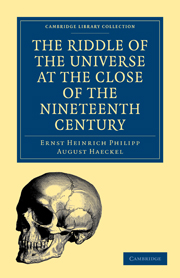Book contents
- Frontmatter
- Contents
- PREFACE
- AUTHOR'S PREFACE
- CHAPTER I THE NATURE OF THE PROBLEM
- CHAPTER II OUR BODILY FRAME
- CHAPTER III OUR LIFE
- CHAPTER IV OUR EMBRYONIC DEVELOPMENT
- CHAPTER V THE HISTORY OF OUR SPECIES
- CHAPTER VI THE NATURE OF THE SOUL
- CHAPTER VII PSYCHIC GRADATIONS
- CHAPTER VIII THE EMBRYOLOGY OF THE SOUL
- CHAPTER IX THE PHYLOGENY OF THE SOUL
- CHAPTER X CONSCIOUSNESS
- CHAPTER XI THE IMMORTALITY OF THE SOUL
- CHAPTER XII THE LAW OF SUBSTANCE
- CHAPTER XIII THE EVOLUTION OF THE WORLD
- CHAPTER XIV THE UNITY OF NATURE
- CHAPTER XV GOD AND THE WORLD
- CHAPTER XVI KNOWLEDGE AND BELIEF
- CHAPTER XVII SCIENCE AND CHRISTIANITY
- CHAPTER XVIII OUR MONISTIC RELIGION
- CHAPTER XIX OUR MONISTIC ETHICS
- CHAPTER XX SOLUTION OF THE WORLD-PROBLEMS
- INDEX
CHAPTER XIII - THE EVOLUTION OF THE WORLD
Published online by Cambridge University Press: 05 August 2011
- Frontmatter
- Contents
- PREFACE
- AUTHOR'S PREFACE
- CHAPTER I THE NATURE OF THE PROBLEM
- CHAPTER II OUR BODILY FRAME
- CHAPTER III OUR LIFE
- CHAPTER IV OUR EMBRYONIC DEVELOPMENT
- CHAPTER V THE HISTORY OF OUR SPECIES
- CHAPTER VI THE NATURE OF THE SOUL
- CHAPTER VII PSYCHIC GRADATIONS
- CHAPTER VIII THE EMBRYOLOGY OF THE SOUL
- CHAPTER IX THE PHYLOGENY OF THE SOUL
- CHAPTER X CONSCIOUSNESS
- CHAPTER XI THE IMMORTALITY OF THE SOUL
- CHAPTER XII THE LAW OF SUBSTANCE
- CHAPTER XIII THE EVOLUTION OF THE WORLD
- CHAPTER XIV THE UNITY OF NATURE
- CHAPTER XV GOD AND THE WORLD
- CHAPTER XVI KNOWLEDGE AND BELIEF
- CHAPTER XVII SCIENCE AND CHRISTIANITY
- CHAPTER XVIII OUR MONISTIC RELIGION
- CHAPTER XIX OUR MONISTIC ETHICS
- CHAPTER XX SOLUTION OF THE WORLD-PROBLEMS
- INDEX
Summary
The notion of creation. Miracles. Creation of the whole universe and of its various parts. Creation of substance (cosmological creation). Deism: one creative day. Creation of separate entities. Five forms of ontological creationism. Theory of evolution. I. Monistic cosmogony. Beginning and end of the world. The infinity and eternity of the universe. Space and time. Universum perpetuum mobile. Entropy of the universe. II. Monistic geogeny. History of the inorganic and organic worlds. III. Monistic biogeny. Transformism and the theory of descent. Lamarck and Darwin. IV. Monistic anthropogeny. Origin of man.
The greatest, vastest, and most difficult of all cosmic problems is that of the origin and development of the world—the “question of creation,” in a word. Even to the solution of this most difficult world-riddle the nineteenth century has contributed more than all its predecessors; in a certain sense, indeed, it has found the solution. We have at least attained to a clear view of the fact that all the partial questions of creation are indivisibly connected, that they represent one single, comprehensive “cosmic problem,” and that the key to this problem is found in the one magic word—evolution. The great questions of the creation of man, the creation of the animals and plants, the creation of the earth and the sun, etc., are all parts of the general question, What is the origin of the whole world?
- Type
- Chapter
- Information
- Publisher: Cambridge University PressPrint publication year: 2009First published in: 1900



